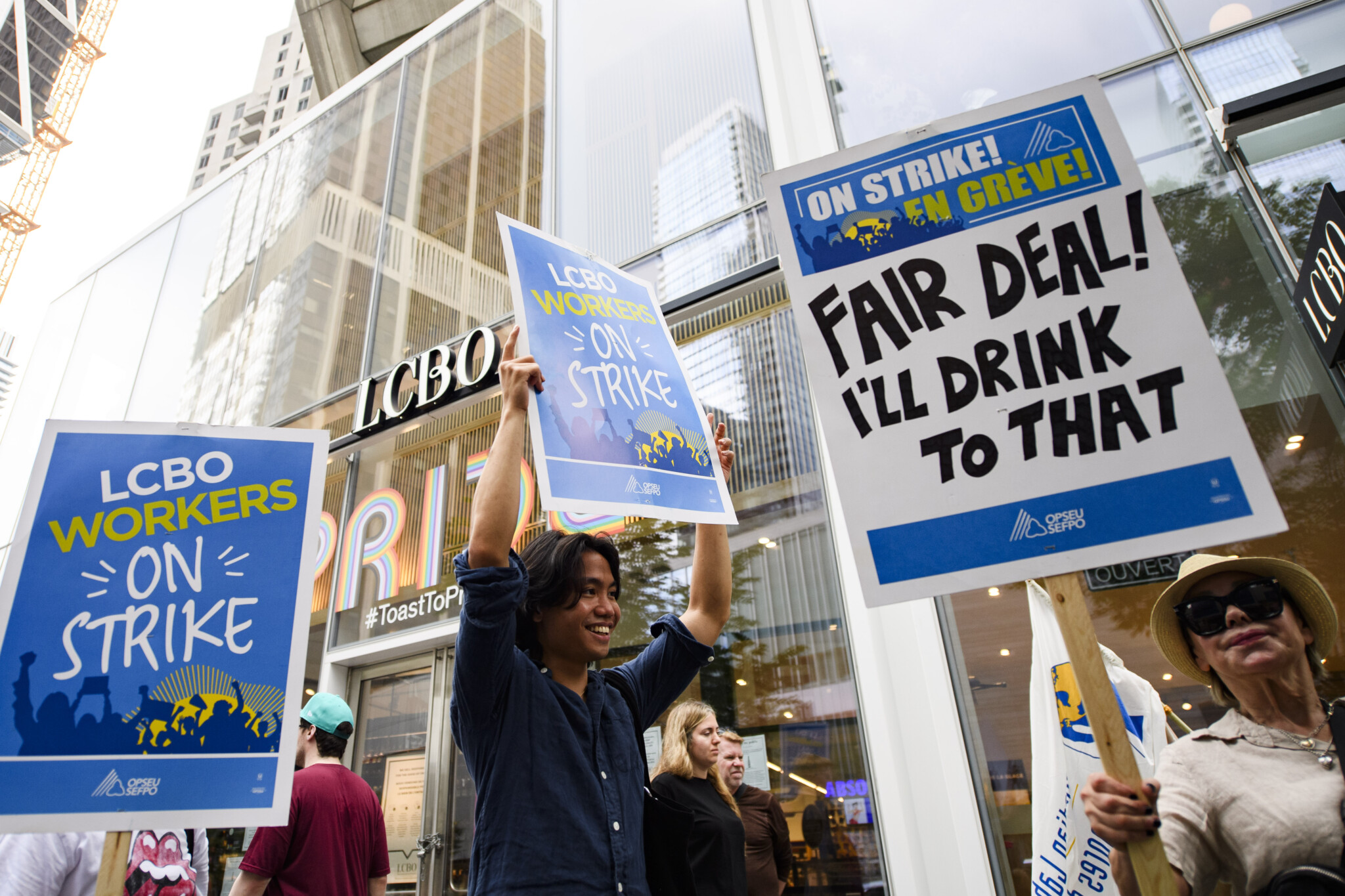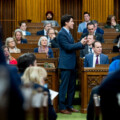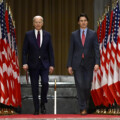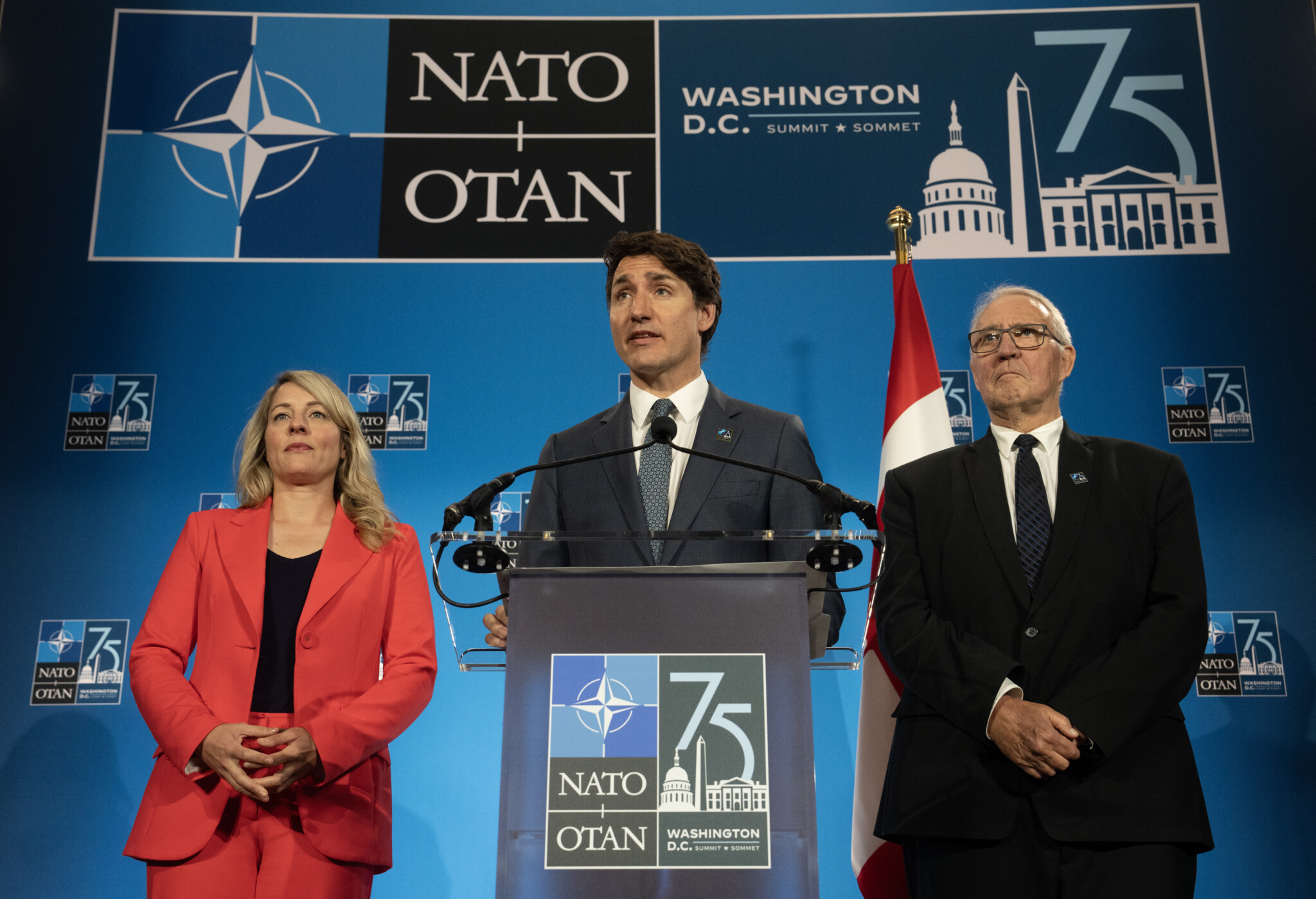My fellow Torontonians receive little appreciation from the folks in other parts of the country, but there are a few things that we are good at and that ought to be acknowledged. One of them is the avoidance of eye contact. This skill is particularly well used in public and on the street. I thought of this the other day as I stumbled into an Ontario Public Service Union picket outside of the LCBO shop at Bloor and Bay.
This was my first encounter with striking LCBO workers. I live close by to a large outlet on busy Yonge Street, which hadn’t had any pickets yet. (It has since.) I guess struck stores are chosen strategically, but I’m not sure on what basis. On the Bloor Street site, around four in the afternoon on a weekday, were somewhere between 12 and 20 strikers carrying signs. They were sort of just milling around. There was no marching nor chanting, at least at the time. One of them tried to hand passersbys a leaflet. I saw no one take one.
Premier Doug Ford says the LCBO workers he’s talked to just want to go back to work. This seems plausible. The ones I saw didn’t seem especially motivated, and maybe a little embarrassed. I was a little embarrassed myself, since if any of them raised their eyes off of the ground and took a good look at me they would have seen in outline in my cloth shopping bag a couple bottles of wine and cans of craft beer. All of which I had just bought at the Eataly shop next door, along with some pasta and prosciutto. It seemed a bit cruel to advertise a future where shopping for food and wine was normal.
I’m not sure how many of the LCBO strikers want to be on strike, but I have a pretty good idea that the union leadership at OPSEU needs the 9,000 members who work for the provincial monopoly more than the 9,000 needs them. A freer market in the sale of alcoholic beverages is certainly unlikely to grow the due-paying membership that pays the union leadership’s salaries. An LCBO cashier with enough seniority to have regular hours does better than a typical private sector one, but not that much better. This industrial conflict is not about putting shoes on the feet of the children of coal miners. It’s about who gets the spoils of government money.
As the two sides dig in, the customers seem okay and free from panic. My son, home for the summer from university, went on a beer run to the nearest location brewery-owned Beer Store. He reported it was no more busy than usual. When I visited a Wine Rack store, owned by the Arterra winery group, I was the only customer on a Sunday afternoon. The sales clerk told me it had been busier than normal over the weekend, but the shelves were fully stocked. The bottle shops I’ve been into, like the one attached to a fancy coffee spot, were also fully stocked. There’s lots of wine, and beer, around.
Winos, like me, tend to congregate around other winos, since after all these are the people who like to drink wine. An informal poll of half a dozen of them reports that none are short of stock. They’ve just switched from retail shopping at the Liquor Control Board to ordering directly from Ontario wineries or the agencies that organize imports. There’s no panic.
I have ordered two cases of wine from importing agents since the strike began. The first arrived in two business days, the other in three. This is not as convenient as strolling into my local monopoly store and buying the wine for dinner that night, but it’s not bad. And the wines are more interesting, generally. They are also more pricey since these are wines targeted chiefly for the restaurant trade. Then again, the wines in the LCBO have also gotten more expensive in the past few years, so an extra dollar or two a bottle seems less painful than it might have before.

Ontario wine for sale at a bottle shop, Toronto, Ontario. Credit: Malcolm Jolley.
My father-in-law was Canadian but lived most of his life in the U.K. He marvelled at the large Toronto LCBO store at Summerhill near to our house. What fascinated him was the array of the offering of wine. There, you could get everything from the brands he would see at the supermarket in rural Wales to Grands Cru or exotic wines worth hundreds of dollars a bottle that might only be found in the fanciest shops in London or by auction.
I miss shopping at that store for this reason. And I miss shopping for wine at a big wine store for the pleasure of browsing. My wife says I shop for wine like she does for clothes. There is as much pleasure in the hunt as there is in the prize. The monopoly, at its flagship locations, offered a department store experience that went from Walmart to Holt Renfrew.
That’s fun, but it’s not normal, and if the liberalization of wine retail sales continues, accelerated by the LCBO strike, then the pay-off for consumers will be specialized shops. This is already the case with the bottle shops in downtown Toronto, which tend toward natural wines. Like any other consumer good, the market will sort itself out.
As this column is posted, I am in Niagara for the I4C, International Cool Climate Chardonnay Conference. The local producers I have talked to so far are blasé about the strike and tell me their sales have not particularly changed over the last two weeks. The general feeling is, in fact, sympathy for the union workers who seem to be trying to delay the inevitable end of the monopoly. The irony being that the strike has only encouraged consumers to find alternatives to it. Once the cork is out of the bottle, the wine gets poured.

















